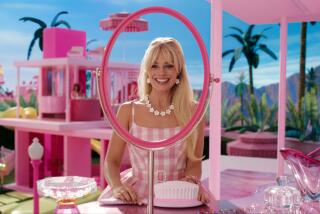Kitschy Pink Flamingo Faces Extinction
- Share via
The plastic pink flamingo, a front-lawn icon that has been reviled as kitschy bad taste and revered as retro cool, is dead at age 49.
The pop culture symbol met its demise after its manufacturer, Union Products of Leominster, Mass., was socked with a triple economic threat -- increases in costs of electricity and plastic resin combined with loss of financing. Production ended in June, and the plant is scheduled to close Nov. 1, according to the president and chief executive, Dennis Plante.
For the record:
12:00 a.m. Oct. 21, 2006 For The Record
Los Angeles Times Saturday October 21, 2006 Home Edition Main News Part A Page 2 National Desk 1 inches; 42 words Type of Material: Correction
Pink flamingos: The article in Thursday’s Section A about Union Products ending production of its patented pink flamingo lawn ornament after 49 years included a photo of flamingos in a frontyard in Ventura. The ornaments shown were not made by Union Products.
Union Products made 250,000 of its patented plastic pink flamingos a year in addition to other garden products.
Robert Thompson, professor of popular culture at Syracuse University, paid tribute to the bird that has been immortalized everywhere -- in the 1970s John Waters movie “Pink Flamingos” and on lawns across America.
“Let’s face it,” he said, “as iconic emblems of kitsch, there are two pillars of cheesy, campiness in the American pantheon. One is the velvet Elvis. The other is the pink flamingo.”
The birth of the plastic pink flamingo in 1957 coincided with a booming interest in Florida, Thompson said, making it possible for those in other parts of the country to have a little piece of the Sunshine State’s mystique in their yard.
By the late ‘70s, according to Thompson, the pink flamingo became a symbol of bad taste. It was considered trash culture and embraced by folks with a wise-guy attitude.
By the late ‘80s and early ‘90s, he said, we learned to make fun of pop culture items such as the pink flamingo as well as appreciate them.
“The pink flamingo has gone from a piece of the Florida boom and Florida exotica to being a symbol of trash culture to now becoming a combination of all we know -- kitsch, history, simplicity and elegance,” Thompson said.
Until recently, Mike Smollon was one of the folks who put the pink flamingo in the kitsch category.
But during a recent trip to Massachusetts, the Boynton Beach, Fla., firefighter and battalion chief had an epiphany -- and bought 12 pairs of flamingos.
“I never owned a pink flamingo before,” Smollon said. “To be honest, I used to think this was the kind of a thing only a girl would put in her yard. But when I found out the factory was closing, I thought, ‘This is something historical happening.’ ”
Smollon went to the factory and bought 11 sets of pink flamingos and one set of the commemorative gold flamingos that were made for 2007, which would have been the bird’s 50th birthday. He plans to keep a few and give the rest to flamingo-loving friends.
Flamingo fever hit, and he searched the Internet for Don Featherstone, the kitschy bird’s creator.
When he learned that Featherstone lived only about five minutes from his hotel, he called and asked if he could stop by and get his photograph taken with Featherstone.
Not only did Featherstone and his wife, Nancy, come out of the house wearing matching pink shirts adorned with green flamingos, the artist autographed two sets of the plastic birds. Smollon also bought a copy of Featherstone’s book, “The Original Pink Flamingos: Splendor on the Grass,” which he autographed for an extra $5.
Featherstone retired as president of Union Products about six years ago, but he still promotes his creation and says he will continue to do so.
Smollon hasn’t been the only person to seek out Featherstone -- several others have also stopped by to get their pictures taken with him.
“They think the pink flamingos could be extinct, and they think I will be extinct soon, too,” he said. “It is sad that it is happening, but it may not be dead yet.”
Featherstone and President Plante are hoping for a resurrection. Plante has been seeking another company to buy the molds. So far, two companies in the U.S. and one in Canada have expressed interest.
“I am hoping that someone will come forward and save the plastic pink flamingo from extinction,” Plante said.
More to Read
Inside the business of entertainment
The Wide Shot brings you news, analysis and insights on everything from streaming wars to production — and what it all means for the future.
You may occasionally receive promotional content from the Los Angeles Times.










